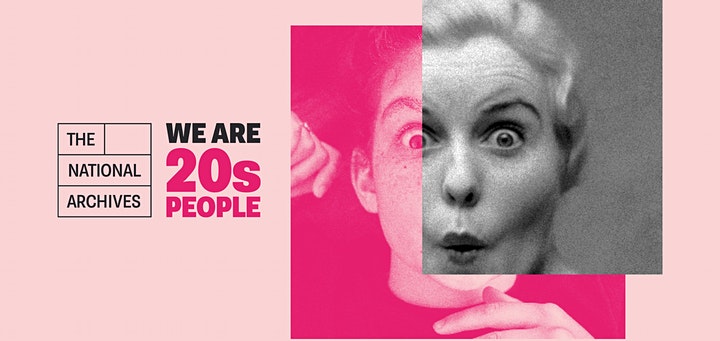 20 People of the 20s is part of 20sPeople – our season to mark the release of the 1921 Census, connecting the 1920s and the 2020s. Researched by Katie Fox, Digital Engagement Manager. Katie is one of the curators of our exhibition The 1920s: Beyond the Roar. In researching for the exhibition she came across Shapurji Saklatvala, one of the first MPs of Indian heritage, and someone who was monitored by the Security Service due to their membership to the Communist Party of Great Britain.
20 People of the 20s is part of 20sPeople – our season to mark the release of the 1921 Census, connecting the 1920s and the 2020s. Researched by Katie Fox, Digital Engagement Manager. Katie is one of the curators of our exhibition The 1920s: Beyond the Roar. In researching for the exhibition she came across Shapurji Saklatvala, one of the first MPs of Indian heritage, and someone who was monitored by the Security Service due to their membership to the Communist Party of Great Britain.
The first MP of Indian heritage to win for Labour
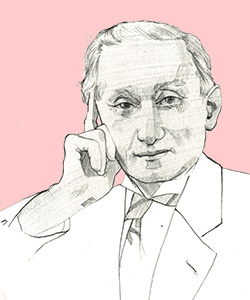
An illustration of Shapurji Saklatvala, drawn from a photograph.. By Sophie Glover.
Shapurji Saklatvala was born in India in 1874, the son of a merchant. His maternal uncle founded what is today the Tata group – a multinational conglomerate. Shapurji worked for the company for part of his career, and first moved to England to run the Manchester office. After moving to England, he married Sarah Marsh, who came from a Derbyshire family, and they went on to have five children. His return in the 1921 Census lists his occupation as ‘office manager’, living with his wife and children; it appears they had a few visitors to their home, too.
Shapurji’s involvement in British politics began a few years later when he joined the Independent Labour Party’s Manchester Branch. He was influenced by the Russian Revolution and the rise of communism, which ultimately led him to leave the party for the Communist Party of Great Britain when it was founded in 1920.
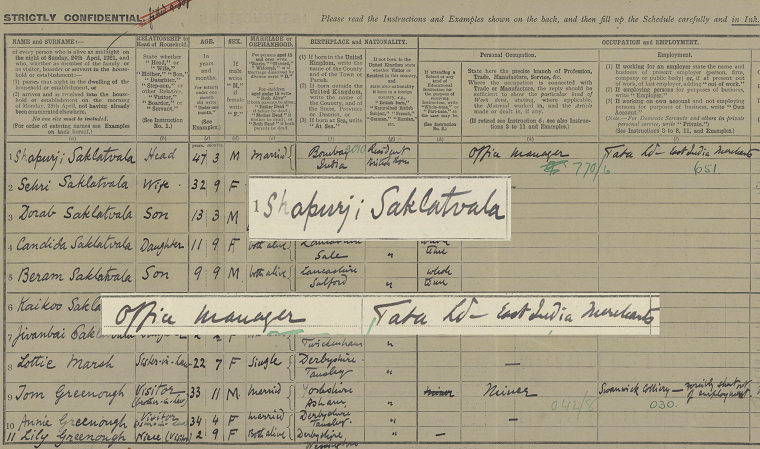
Shapurji Saklatvala’s 1921 Census record
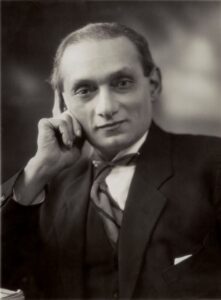
Shapurji Saklatvala, 1922 © National Portrait Gallery, London
He stood for parliament, and was endorsed by Labour, in the October 1922 general election, winning the Battersea North seat. While he lost the seat in the election the following year, he then reclaimed it and remained an MP until 1929.
Like many other communists – and suspected communists – Shapurji was watched closely by the Security Service. Communism was feared by many, especially the establishment, after witnessing the change in power and upheaval experienced as a result of the revolution in Russia. The detailed surveillance carried out by the British state provides an enormous amount of detail about Shapurji’s life and associations. Though our records on him only offer the state’s perspective, they are nevertheless a valuable insight into a man who agitated for change throughout the 1920s.
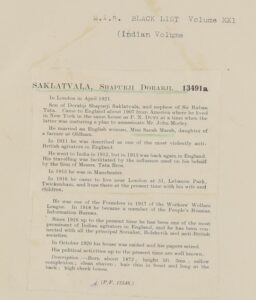
Cutting of the MI5 Black List entry for Shapurji Saklatvala, 1921 (catalogue ref: KV 2/614)
From the records that we hold we know that Shapurji was vocal on issues such as both Indian and Irish independence, as well as decolonisation more generally. When researching the exhibition it was noticeable that he was involved in many of the key moments of the 1920s that had been identified, for example he attended the 1921 Pan-African Congress. Most notably, he was arrested in 1926 during the General Strike for giving a speech in support of miners. This speech, as an act of sedition, saw him receive a two month prison sentence. The National Archives’ records show that Shapurji was not only talking about the rights of coal miners during the period of mass industrial action; within the records is an extract of a speech given in 1922 which includes the line:
‘Coal produces all the light and comforts, but you don’t find them in the colliery villages’
Like so many people during the 1920s, and those featured in our exhibition, The 1920s: Beyond the Roar, Shapurji Saklatvala agitated for change and for causes close to his heart. Whilst not everyone in society was in a position of influence, as Shapurji was, many were vocal and demanded reform.
Find out more
Our guides to researching 20th century political history can be found here: Political history research guide
The National Archives’ new exhibition, ‘The 1920s: Beyond the Roar’, will open on 21 January 2022. Find out more here: The 1920s: Beyond the Roar
What is 20 People of the 20s?
20 People of the 20s is a project where staff members at The National Archives have researched a story of someone from the 1920s. From family members and First World War service personnel, to famous performers and politicians, we hope these stories will encourage you to explore the breadth of experience in 1920s Britain. 20 People of the 20s is part of 20sPeople – our season to mark the release of the 1921 Census, connecting the 1920s and the 2020s. Find out more here.
